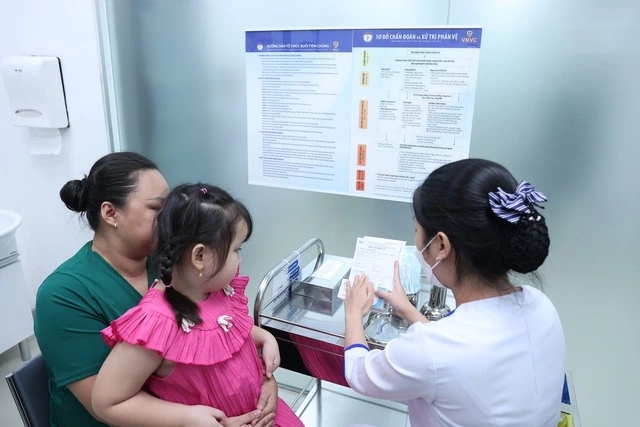Viet Nam starts inoculating dengue vaccine
VGP - The Viet Nam Vaccine Joint Stock Company (VNVC) has officially deployed Takeda's dengue vaccine (Japan) for children aged 4 and older, as well as adults, throughout almost 200 immunization facilities nationwide amidst the ongoing rainy season.

This is the first time Vietnamese people can to acquire this vaccine after years of anticipation and observing the rampant dengue epidemic, which has significantly impacted public health and livelihoods.
Takeda's dengue vaccine, developed in Japan, was first administered globally in 2018 and is currently utilized in over 40 countries, particularly in regions with recurrent severe epidemics. It demonstrates an efficacy of up to 80 percent and reduces the risk of hospitalization by as much as 90 percent.
The vaccine was approved by the Vietnamese Ministry of Health this May.
It is highly anticipated due to the annual occurrence of various outbreaks resulting in hundreds of thousands of cases and numerous fatalities across multiple regions.
The vaccine is particularly effective in preventing reinfection in individuals who have previously contracted dengue fever, which is crucial for Viet Nam due to the high prevalence of such cases.
Subsequent infections are often more severe than initial ones; therefore, timely vaccination is essential for safeguarding patients' health and lives.
In recent years, the dengue epidemic has changed, no longer developing in cycles but increasing steadily every year, especially at the end of the year. This dilemma arises from the effects of urbanization and global warming, which have established conducive environments for disease-carrying mosquitoes to flourish. Viet Nam reports 200,000 cases and dozens of dengue-related deaths every year.
In 2024, a surge in dengue fever cases across Việt Nam has led to several fatalities. With nearly 53,000 cases reported nationwide since the beginning of the year, authorities are coping with a more severe outbreak compared to previous years.
The General Department of Preventive Medicine under the Ministry of Health predicts that climate change coupled with the prolonged El Nino phenomenon in 2023-2024 will create favorable conditions for mosquitoes to breed, making it easier for mosquito-borne infectious diseases, especially dengue fever, to spread.
Viet Nam has become one of the countries capable of producing 11 out of 12 vaccines used in the expanded immunization program that has been carried out in the country./.

